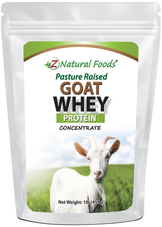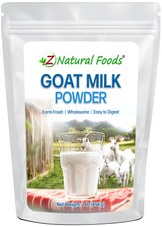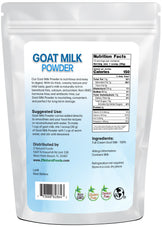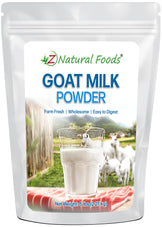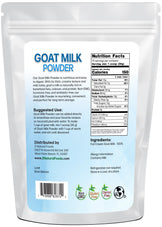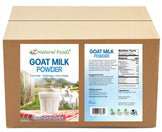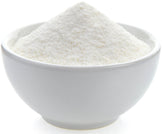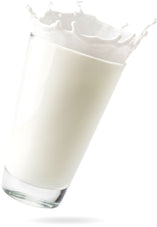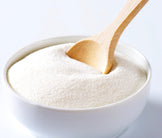Description
Description
Goat milk powder has been a staple in various cultures for centuries, offering a nutritious alternative to cow's milk.
Its popularity stems from its nutrient profile, its smooth digestion properties and potential health benefits.
Today, we review why our Goat Milk Powder is a premium product and how our farms produce a truly superior product – delivering the most pure, highly nourishing Goat Milk available today.
In case you are new to Goat Milk, let’s start by reviewing a few reasons why people like Goat Milk.
Top Reasons Customers Choose Our Goat Milk Powder
Nutritional Advantages
Goat milk is highly nutritious, offering a rich source of essential nutrients such as proteins, fats, vitamins, and minerals.
Notably, it contains higher levels of medium-chain fatty acids (MCTs), which are more readily absorbed and metabolized by the body, contributing to its digestibility and potential health benefits.
Additionally, goat milk provides significant amounts of calcium and phosphorus, essential for bone health, and contains bioactive compounds that may enhance nutrient absorption and support the immune system. (1,5,6,7)
These nutrients contribute to bone health, immune support, and overall well-being.
Natural A2 Milk, and a Lower Lactose Content
One of the standout features of goat milk is its ease of digestion.
The protein and fat molecules in goat milk are smaller than those in cow's milk, making them easier for the human digestive system to process.
Additionally, goat milk typically contains less lactose than cow's milk, which may benefit individuals with mild lactose sensitivities. (2)
Goat milk is a natural source of A2 milk because goats predominantly produce milk containing the A2 beta-casein protein rather than the A1 beta-casein protein found in some cow's milk. This makes goat milk easier to digest for individuals sensitive to A1 protein, which is commonly found in conventional cow’s milk.
Culinary Uses
Goat milk powder is versatile in the kitchen. It can be reconstituted with water to create liquid goat milk, suitable for drinking or adding to cereals and beverages.
Additionally, it's an excellent ingredient for baking, cooking, and even making homemade yogurt or cheese. Its creamy texture and mild taste enhance various recipes, from smoothies to soups.
Storage and Convenience
Unlike fresh milk, goat milk powder has a longer shelf life and doesn't require refrigeration until it's reconstituted.
This makes it a convenient option for those who want to enjoy the benefits of goat milk without worrying about spoilage. It's also a practical choice for emergency food storage or for individuals with limited access to fresh dairy products.
With that, let’s quickly review why the protein in goat milk is so important.
How is goat whey protein produced?
A high-quality goat whey protein is produced using the same cold-filtration and dehydration process used to make high-quality whey from cow milk.
-
Fresh goat milk is collected and immediately brought to the processing facility.
-
A coagulant is added to the milk to create cheese and separate the curds from the whey.
-
The liquid whey is drained to separate it from the curds and then undergoes a cold filtration process, which filters out any unwanted components.
-
Using a low-temperature method, the whey is dehydrated, allowing moisture to be removed.
Finally, the dehydrated whey is ground into a fine powder to create a smooth, creamy, consistent texture. An adequately produced goat whey protein only uses a cold-filtration process and never uses high heat or acid, ensuring that you get maximum nourishment from every scoop.
Goat Whey: L-Leucine and Protein Synthesis
To understand why whey protein is such a fantastic food, we need to examine protein synthesis and the role of the amino acid L-leucine in this process. In simple terms, protein synthesis is the process in which cells make protein by assembling amino acids and bonding them into specific polypeptide sequences.
This process occurs in two stages: transcription and translation. Once the polypeptide chain is synthesized, it forms the finished protein.
So, how does the amino acid L-leucine play a role in this essential process? Whey protein is the highest biological source of this essential amino acid. Furthermore, Leucine has been reported to increase protein synthesis by increasing the phosphorylation of proteins involved in the mTOR signaling pathway.
Phosphorylation is critical in regulating cell cycle, growth, and apoptosis. mTOR also regulates cell proliferation, autophagy, and apoptosis. However, much like inflammation, with mTOR, balance is the key, as too much or too little can potentially cause various health issues.
The following was stated In a preliminary study looking at the protective qualities of sheep/goat whey protein in preventing the overactivation of mTOR in rats:
-
The results obtained showed a decrease in the levels of essential and branched-chain- amino acids in the experimental group.
-
p70-S6K1 expression was decreased in the liver of rats that consumed whey protein.
Therefore, the following was concluded:
“The reduction of amino acid levels and the concomitant inactivation of mTOR implies that whey could potentially act protectively against disorders induced by mTOR overactivation.”
Goat whey protein concentrate
-
A complete protein yielding 80% protein concentration
-
Approximately 2 grams of carbohydrates and under 1 gram of fat per average serving
-
Goat Whey protein concentrate has many components, like beta-lactoglobulin, alpha-lactalbumin, immunoglobulin, and lactoferrin.
-
It is a quality source of Branched-chain amino acids (especially leucine)
-
It is an undenatured protein
-
Whey concentrate does contain lactose
Casein is the largest group of proteins in milk, making up 80% of the total protein content. A1 and A2 are beta-casein variants. While they are pretty similar, their primary difference is at position 67 of the amino acid sequence: histidine for A1 and Proline for A2.
As a Natural Source of A2 Milk, Goat Milk is Easier to Digest
However, research suggests that this slight difference has quite an impact on digestion. It is believed that A1 beta-casein releases an opioid peptide (BCM-7) that is considered to be a precursor to various health issues like gut health, heart disease, and diabetes through the increase of systemic inflammation.
The following was stated in a randomized control trial looking at the effects of milk containing only A2 beta casein versus milk containing both A1 and A2 beta casein proteins on gastrointestinal physiology, symptoms of discomfort, and cognitive behavior of people with self-reported intolerance to traditional cows' milk.
-
Compared with milk containing only A2 β-casein, the consumption of milk containing both β-casein types was associated with significantly greater PD3 symptoms;
-
Higher concentrations of inflammation-related biomarkers and β-casomorphin-7. Longer gastrointestinal transit times and lower levels of short-chain fatty acids; and increased response time and error rate on the SCIT.
-
Consumption of milk containing both β-casein types was associated with worsening PD3 symptoms relative to baseline in lactose-tolerant and lactose-intolerant subjects. Consumption of milk containing only A2 β-casein did not aggravate PD3 symptoms relative to baseline (i.e., after washout of dairy products) in lactose-tolerant and intolerant subjects.
Therefore, it was concluded that “consumption of milk containing A1 β-casein was associated with increased gastrointestinal inflammation, worsening of PD3 symptoms, delayed transit, and decreased cognitive processing speed and accuracy.
Because the elimination of A1 β-casein attenuated these effects, some symptoms of lactose intolerance may stem from the inflammation it triggers and can be avoided by consuming milk containing only the A2 type of beta-casein.
Now, let’s review why we choose Dutch farms for our premium Goat Milk.
The Netherlands stands out as a leader in goat milk production quality and efficiency for several key reasons:
Z Natural Foods invests considerable time and resources in identifying the best product to deliver to our valuable customers.
While some regions produce an excellent goat milk product, our research shows that Dutch farmers consistently produce the highest quality goat milk at an unmatched level of efficiency, largely due to the region’s commitment to high-quality, eco-friendly farming practices.
This means great nutrition, free of chemicals, non GMO, Kosher certified and more.
In fact, Dutch farms are renowned for their lush Goat-friendly pastures, which provide goats with a natural, nutrient-rich diet. This in itself creates a wonderful habitat for happy, thriving goats.
This ensures the milk contains essential vitamins and minerals while maintaining a creamy, pure taste.
By sourcing from these sustainable farms, Z Natural Foods delivers a premium product that supports animal welfare, environmental responsibility, and the health-conscious consumer's need for wholesome milk powder.
Let’s explore a little deeper into why we love these Dutch farming practices for our Goat Milk powder.
Advanced Farming Practices
Determining the best quality goat milk involves evaluating factors such as milk composition, hygiene standards, and farming practices.
Dutch farmers are renowned for their advanced dairy goat farming systems. They implement stringent hygiene protocols, optimized feeding strategies, and regular health monitoring, contributing to superior milk yield and composition. For instance, a study in the Journal of Dairy Science highlights the importance of low somatic cell counts and total bacterial counts in maintaining milk quality, parameters that are closely monitored. (3)
Additionally, research shows the role of advanced farm management practices directly correlates with enhancing milk quality. These factors collectively contribute to high-quality goat milk production.
A popular breed of Dutch dairy goats are white Saanen goats, also known as the Dutch white goat, known for producing high-quality milk.
Through selective breeding, Dutch farmers have developed goat lines optimized for milk production in their specific farming systems.
Rigorous Quality Control
Our Dutch goat farms adhere to stringent quality assurance protocols:
-
All our farmers follow the “KwaliGeit” (QualiGoat) system, which sets high standards for animal welfare, hygiene, and milk quality set up by Dutch Goat Dairy Organization (NGZO), and includes requirements from European hygiene regulations.
-
Our Goat Milk and the related processes undergoes frequent testing for bacteria, farm hygiene, veterinary medicine, animal health and welfare, feed and water, milk extraction and refrigeration, and assessment and certification
-
The entire production chain is closely monitored, from farm to milk processing.
Innovation and Research
Dutch farmers make it a practice to implement ongoing investment in research and development to further improve goat farming practices, nutrition, and genetics.
This culture of innovation helps Dutch farms stay at the forefront of the industry.
Specialized Industry Structure
The Dutch goat dairy sector is highly specialized, with most farms focusing exclusively on milk production.
This specialization allows for greater expertise and efficiency compared to dual-purpose (meat and milk) systems common in many other countries.
Favorable Climate and Infrastructure
The Netherlands' temperate climate and excellent agricultural infrastructure provide ideal conditions for year-round goat milk production. (4)
While other countries certainly produce high-quality goat milk, the combination of these factors enables Dutch goat farms to consistently produce some of the highest quality milk in the world at an unmatched level of efficiency.
Incorporating goat milk powder into your diet can be a nutritious and convenient way to enjoy the benefits of goat milk.
Whether you're looking to improve digestion, increase your intake of essential nutrients, or explore new culinary possibilities, goat milk powder is a valuable addition to your pantry.
For more information about our Goat Milk Powder, go here:
For more information about our Goat Whey Protein Concentrate, go here:
References:
-
Singh, Sandeep, et al. "Goat Milk Composition and Nutritional Value: A Review." The Pharma Innovation Journal 10, no. 6S (2021): 536-540.
-
Singh, Sandeep, et al. "The Nutritional Therapeutic Values and Chemical Properties of Goat Milk." IP Journal of Nutrition, Metabolism and Health Science 5, no. 3 (2022): 118-123.
-
Leitner, Gabriel, et al. "Somatic Cell Counts and Bacterial Counts in Goat Milk—Their Association with Udder Health and Milk Quality." Journal of Dairy Science 87, no. 3 (2004): 540-552.
-
Pulina, Giuseppe, Armin Gemignani, Gianfranco Molle, Mónica Salari, and Antonello Cannas. "The Quality of Goat Milk: Nutritional and Technological Implications." Small Ruminant Research 190 (2019): 106146. https://doi.org/10.1016/j.smallrumres.2020.106146.
-
Haenlein, G. F. W. "Goat Milk in Human Nutrition." Small Ruminant Research 51, no. 2 (2004): 155-163.
-
Park, Y. W. "Goat Milk—Chemistry and Nutrition." In Handbook of Milk of Non-Bovine Mammals, edited by Y. W. Park and G. F. W. Haenlein, 34-58. Oxford: Blackwell Publishing Professional, 2006.
-
Alferez, M. J. M., and M. S. Campos. "Beneficial Effect of Goat Milk on Nutritive Utilization of Iron and Copper in Malabsorption Syndrome." Journal of Dairy Science 86, no. 2 (2003): 389-394.



